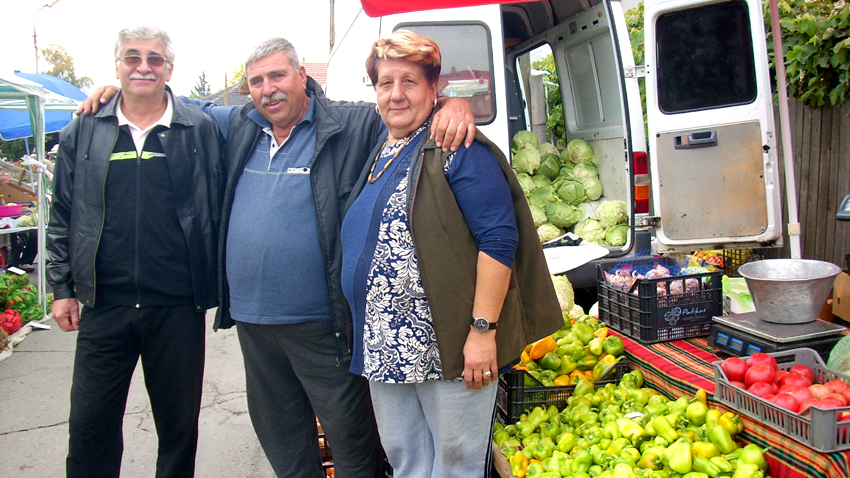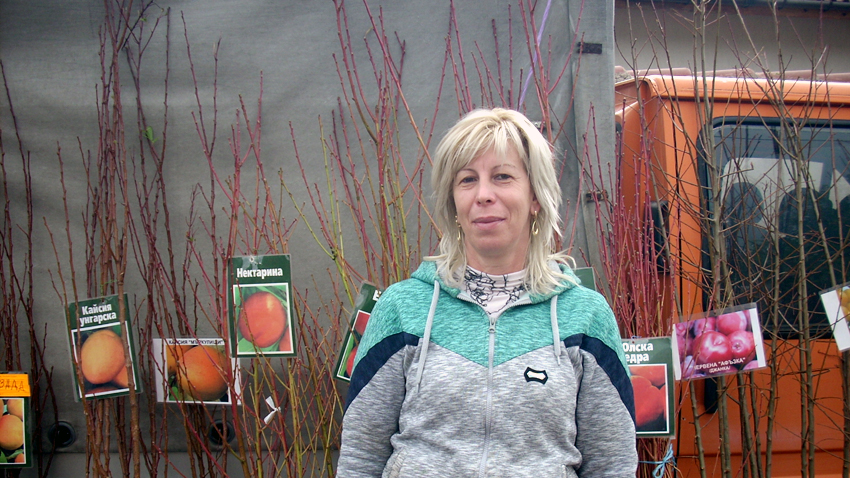In summer heat and in winter frost salesmen never miss a Sunday when they can quite legally, “invade” the entire central street in the small town of Zlatitsa. People who grow fruit, vegetables and flowers, people who sell garden and farm tools all descend upon the town from near and far. Sunday market is an important event for Zlatitsa. Here you might meet the mayor, the teacher, the doctor, the shepherd. The stalls offer all kinds of goods that cater for every taste and every pocket.
There is no trade centre or e-catalogue that can take the place of the Sunday market. It is a place where people meet or simply bump into each other, where they stand around talking to the tradesmen or exchange good-natured banter. Market day is a veritable fete. Young families meander between the stalls with their children, stopping to buy ice-cream or toys. But the market is a boon most of all for housewives because here, they can take their pick and talk to the producers in person. There is a constant buzz, with people taking their pick of peppers, tomatoes, cabbage, carrots – these are things that sell like hot cakes now, because it is preserve-making season.
Vesselina Bakova from Lyuben village is here to sell the things her family grow in their own garden. To get to the Sunday market in time, Vesselina and her husband have to start on the road at 3 AM. Despite the fatigue they are invariably courteous with customers:

“We are here, at this market every Sunday. We grow the fruit and vegetables ourselves and they sell really well. We have regular customers. We are here all the year round. I am a school teacher and I have one year to go until I retire, though I have always worked in the field and in our garden. If you are not afraid of hard work, if you spend money prudently then you can make a living out of farming. At the market we are courteous with each customer. We ourselves are gregarious, we love to have relatives and friends over, but there just isn’t enough time. My husband has a job, but when we get home we go out to the fields. So, it is here that we get to meet different people.”
Radka Ilieva comes to Zlatitsa on the previous day, Saturday because she comes all the way from Sliven where she has fruit-trees.
“We are glad of the chance to meet different people. We constantly get asked how the trees are planted, whether we are ourselves growers, and I always give advice on what should be planted and where, depending on the climate and the season. I sell more than 40 species of saplings but apricot, cherry, pear, peach and apple are in demand most. We work together with my husband. We are constantly gathering information about the trees we grow, we are on the lookout for grafts online. This business takes perseverance and lots of hard work but also people you can count on, people who have nerves of steel and lots of patience. Problems arise mostly because people are poor. We have achieved everything with our own money, we owe banks nothing and get no subsidies. What motivates me in this difficult business are people. Most are amiable and kind and we get to talk here, at the market. There seems to be a revival of this kind of markets which bring producers and customers in direct contact.”

Stefan makes horse reins, leashes, wrought iron items and farm tools. He has been coming here every Sunday for 30 years but he says there are less and less farm animals which is affecting his own trade:
“People here know me and seek me out. Trust is something that takes time to earn if the products you sell are high quality and if you don’t deceive people. I learnt my trade from my father and from the older people. I also sell things made by other artisans who are unable to come to the market every week. The longer you come to the market, the more experience you accumulate, the greater the respect of colleagues and clients. This business involves all members of my family – my brother, my father, my wife, they all come to the market with me to sell our wares. Sometimes old-time customers come to say hello, but they don’t buy anything because they have sold their horses or sheep. Until a few years ago there was lots of work, now I’m thinking of taking up a different trade.”
English version: Milena Daynova
Gergana ManchevaRuse now has the longest wooden pedestrian bridge in Bulgaria. The facility was opened at the end of 2024 in the Lipnik Forest Park. The bridge with a total length of 28 m is equipped with a glass railing and 7 glass windows, which..
The 147th anniversary of the liberation of Sofia from Ottoman rule was celebrated with a historical re-enactment in the capital's North Park. "The re-enactment recreates the three battles of the villages of Sarantsi, Dolni Bogrov and Vrazhdebna and..
The Sofia Zoo proudly announced a record number of animals born in 2024. "Our wolf pack grew by nine wolf pups. We welcomed a baby zebra, kudu antelopes and several giraffe calves. We also had additions from the primates, the Asian small-clawed..
On the night of 19-20 January - the celebration of Yordanovden (Epiphany) and Ivanovden (St. John's Day) in the Julian calendar - the northwestern town of..
Interest in the exhibitions and events at the Regional History Museum in Ruse on the Danube is growing. In the last 12 months, it had 95 966 visitors,..
From the first attempts to fly with homemade wings back in the 19th century, to the world's first combat flights with reconnaissance and bombing..

+359 2 9336 661
